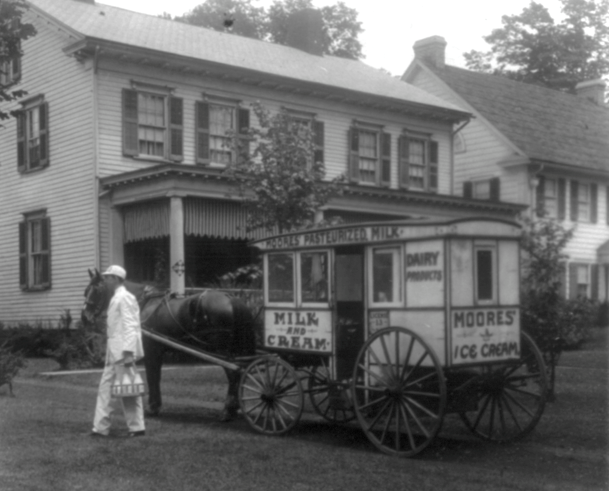During the late ’60s and ’70s when I was a child, a milkman pulled up in his truck outside our house almost every day in the wee hours of the morning to leave four quarts of milk by our front door. He repeated this at almost every home on our street.
This service wasn’t unique to my neck of the woods in Quebec. Newsroom staffer Naoibh O’Connor remembers arguments with other kids on her Calgary street over who had enough courage to ask the milkman for a chunk of ice from his truck to cool down on a hot summer’s day. New Brunswick-raised staffer Andrew Fleming recalls the milkman letting him and his friends ride in the back of the truck around his Saint John neighbourhood for a lark.
These memories came flooding back after author John DeMont visited the Courier recently to promote his book A Good Day’s Work: In Pursuit of a Disappearing Canada.
As memories were being shared, sports reporter and Gen Yer Megan Stewart piped up and sent us into fits of laughter. “I always thought the milkman was a myth … as in a metaphor for infidelity,” said Stewart.
The Halifax-based writer, author of three other books including Citizens Irving: The Irvings of New Brunswick and columnist at the independently owned The Chronicle Herald newspaper, includes a chapter called “The Milkman Cometh” about a milkman who has been delivering milk to Haligonians since the mid-’60s. Bill Bennett, the son of a milkman, is ready to retire, but there is no one willing to take over his route. DeMont calls Bennett’s kind a dying breed. (And yes, DeMont does reference jokes about the milkman coming to the aid of a distressed housewife.)
But that’s not the real reason the milkman is vanishing. My mother stopped milk delivery once grocery stores sold milk in large quantities at a lower cost. I’m sure she wasn’t the only one.
DeMont is the first person to admit that his book highlighting what he thinks are 10 vanishing professions in Canada may sound as if he is “one of those old coots who believes the past is the only place where anything monumental occurs.”
He accepts that “change is a necessity along with a virtue” in the 21st-century global world, but that hasn’t stopped him from thinking about how things used to be. Not surprising really, given generations of his family worked in the coal mines going back to the 18th century.
And it’s not hard to agree with his statement that all progress isn’t necessarily good. “And when things go, they are gone forever,” he writes.
His book, he says, is a living history of vanishing professions that tells us a lot about ourselves and the country.
“It’s the fact that the iconic Canada is disappearing — the close-knit communities and small towns — and it’s told through these jobs.”
Take paperboys. I remember peering out my bedroom window early some mornings and watching our teenage neighbour preparing his morning delivery of the Montreal Gazette (or was it the Montreal Star?). In winter, he’d strap a sled behind his black Labrador retriever who pulled twine-wrapped piles of that day’s edition through the snowy streets — the stillness of the dark winter morning only broken by the roar of a snowplow.
One of DeMont’s first jobs was delivering papers. “Now of course there are no paperboys,” he says. “There are paper men and women who drive cars.”
He’s right. My daily paper is delivered without fail every morning around 4 a.m. I am a light sleeper and can hear him pull up in his car, open our gate and place the paper by the front door. I don’t hear him make any other stop on my block, which fills me with sadness — as it does DeMont. We both lament the demise of newspapers. Other types of industries are also facing challenges, but the newspaper business, as DeMont writes, “is my business.”
Of the 10 vanishing jobs he highlights in his journey across Canada, the one celebrating a weekly newspaper owner/columnist (Paul MacNeil of the Eastern Graphic in P.E.I.) resonated the most. Maybe it’s because DeMont declares his love for community newspapers. “Let me let you in on a little secret,” he writes. “There’s only one place to find out the truth about existence in those rural areas where most of us once lived: in the pages of a weekly paper.”
I’m biased of course, but his observation on history should give everyone pause. “A century from now, who will the historians consult? Where will a person turn to learn what these towns were like? A blog? A tweet? A podcast?”
Other vanishing jobs DeMont highlights through his journey across Canada include locomotive engineers, lighthouse keepers, doctors who make house calls, blacksmiths, big animal vets, drive-in movie projectionists, travelling salesman, record store owners and an old-school Alberta rancher (I loved that chapter).
I’m not as nostalgic as DeMont, but it’s hard not to wonder where our society is heading when our interaction with others diminishes with each click of a mouse.
fhughes@vancourier.com
twitter.com/HughesFiona



